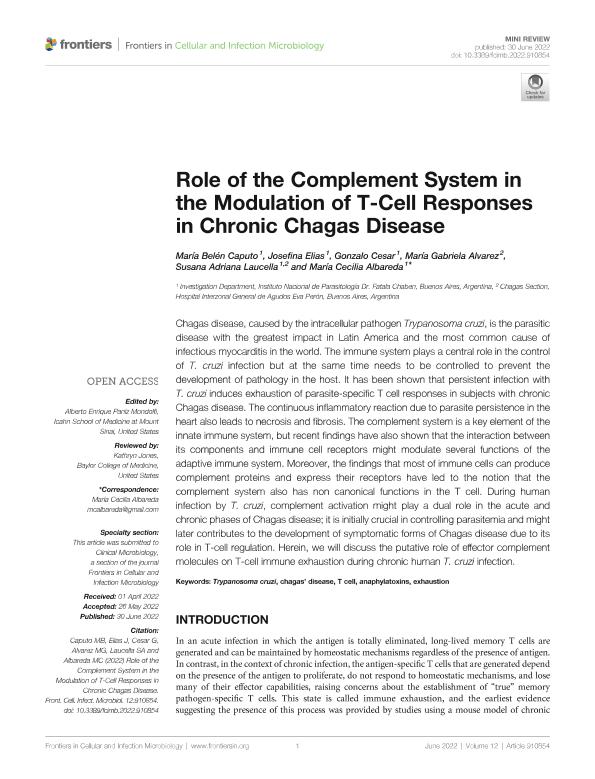Artículo
Role of the Complement System in the Modulation of T-Cell Responses in Chronic Chagas Disease
Caputo, María Belén ; Elias, Maria Josefina; Cesar, Gonzalo Leandro
; Elias, Maria Josefina; Cesar, Gonzalo Leandro ; Alvarez, María Gabriela; Laucella, Susana Adriana
; Alvarez, María Gabriela; Laucella, Susana Adriana ; Albareda, María Cecilia
; Albareda, María Cecilia
 ; Elias, Maria Josefina; Cesar, Gonzalo Leandro
; Elias, Maria Josefina; Cesar, Gonzalo Leandro ; Alvarez, María Gabriela; Laucella, Susana Adriana
; Alvarez, María Gabriela; Laucella, Susana Adriana ; Albareda, María Cecilia
; Albareda, María Cecilia
Fecha de publicación:
06/2022
Editorial:
Frontiers Media
Revista:
Frontiers in Cellular and Infection Microbiology
ISSN:
2235-2988
Idioma:
Inglés
Tipo de recurso:
Artículo publicado
Clasificación temática:
Resumen
Chagas disease, caused by the intracellular pathogen Trypanosoma cruzi, is the parasitic disease with the greatest impact in Latin America and the most common cause of infectious myocarditis in the world. The immune system plays a central role in the control of T. cruzi infection but at the same time needs to be controlled to prevent the development of pathology in the host. It has been shown that persistent infection with T. cruzi induces exhaustion of parasite-specific T cell responses in subjects with chronic Chagas disease. The continuous inflammatory reaction due to parasite persistence in the heart also leads to necrosis and fibrosis. The complement system is a key element of the innate immune system, but recent findings have also shown that the interaction between its components and immune cell receptors might modulate several functions of the adaptive immune system. Moreover, the findings that most of immune cells can produce complement proteins and express their receptors have led to the notion that the complement system also has non canonical functions in the T cell. During human infection by T. cruzi, complement activation might play a dual role in the acute and chronic phases of Chagas disease; it is initially crucial in controlling parasitemia and might later contributes to the development of symptomatic forms of Chagas disease due to its role in T-cell regulation. Herein, we will discuss the putative role of effector complement molecules on T-cell immune exhaustion during chronic human T. cruzi infection.
Palabras clave:
ANAPHYLATOXINS
,
CHAGAS’ DISEASE
,
EXHAUSTION
,
T CELL
,
TRYPANOSOMA CRUZI
Archivos asociados
Licencia
Identificadores
Colecciones
Articulos(SEDE CENTRAL)
Articulos de SEDE CENTRAL
Articulos de SEDE CENTRAL
Citación
Caputo, María Belén; Elias, Maria Josefina; Cesar, Gonzalo Leandro; Alvarez, María Gabriela; Laucella, Susana Adriana; et al.; Role of the Complement System in the Modulation of T-Cell Responses in Chronic Chagas Disease; Frontiers Media; Frontiers in Cellular and Infection Microbiology; 12; 6-2022; 1-6
Compartir
Altmétricas



